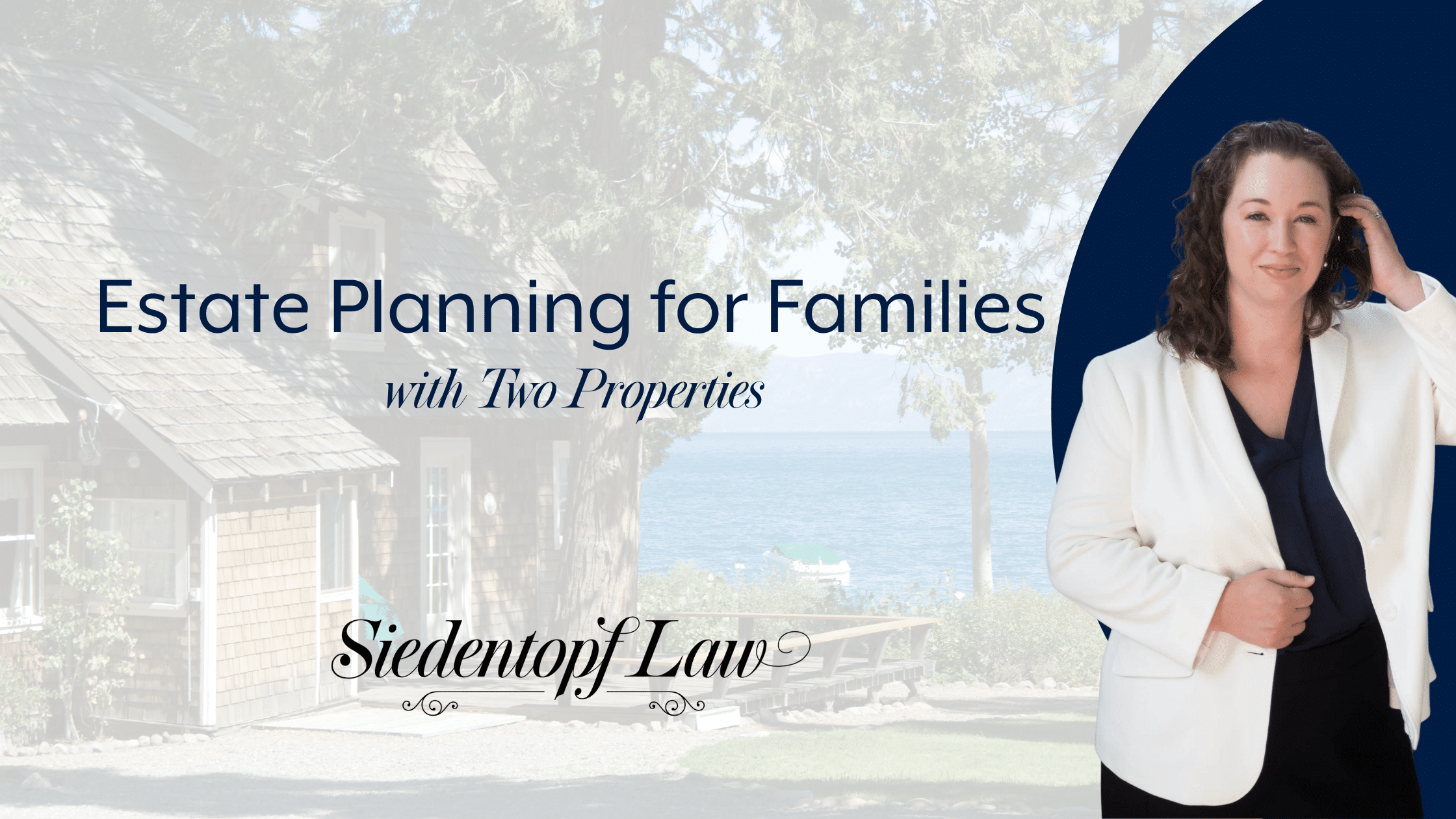Estate Planning for Families with Two Properties

Becoming a homeowner is a massive accomplishment. Real estate prices have soared everywhere over the last decade and purchasing a home can be difficult for many. But somehow you’ve managed to purchase your home and also an additional property! Bravo!
Maybe that second property is a vacation home, a long or short term rental, or perhaps it’s even a commercial property.
Every single person needs a good estate plan. But people who own more than one property really really need great estate plan. And like we say from time to time: you don’t need a cookie cutter plan because you are not a cookie.
Trust-Based Plan
If real estate is a part of a person’s assets, we almost always recommend using a Trust-based plan.
Trusts are really powerful legal tools that distribute your assets upon your death. But one of the wonderful things about trusts is that they can protect yours assets even while you are alive.
When we say a Trust-based plan, you may have thoughts of your children becoming spoiled because they are swimming in gold coins like Scrooge McDuck, but that isn’t necessarily what we mean. Trusts are strategic legal documents that can help you transfer wealth responsibly to those that you love.
There are many types of Trusts to meet many different needs. Today I want to highlight two different options.
Living Trusts
A Living Trust, or a Revocable Living Trust, is an agreement between you (the trust maker) and usually you as the trustee. This legal contract, known as the trust agreement, puts rules into place for how your assets are held and used during your lifetime and after your death. The reason it is called a Living Trust is because while you are alive the document is living. It can be changed or even revoked completely by you, the trustee. But it becomes fixed or irrevocable upon your death.
Many of our clients love utilizing a Living Trust because it gives them a lot of flexibility during their lifetime, but doesn’t allow future trustees to deviate from your plan after your death. This really removes stress or fear because you can trust that your trustee will follow your wishes and cannot deviate from them. And if they do the Court can step in and require them to follow the trust agreement as it was written, because they have no legal right to change anything.
Irrevocable Trusts
There may be strategic reason to create an Irrevocable Trust. Every family and situation is unique, so it may serve you best to have all or a portion of your estate in an Irrevocable Trust. This may be to limit tax liability or simply to prevent changes being made by your co-settlor after your death.
These types of trusts cannot be changed once put into place. Additionally, you as the trust maker cannot serve as the trustee. Because these Trusts are, more or less, set in stone, you really need a professional, like us at Siedentopf Law, to help you create this type of Trust. Creating an Irrevocable Trust is a serious thing and should never be DIY’d. I know this sounds scary, and it is because when done improperly an Irrevocable Trust could be detrimental to you and your family. However, in the right situation and with the right candidates the benefits of utilizing this type of Trust could be felt for generations to come.
There are countless other types of trusts that can meet a variety of personal, financial, and tax liability needs. To learn more: watch this video.
LLC Formation
If your real estate produces income, another great option is to form an LLC. LLC’s are amazing ways to leave a legacy to future generations—especially if your children or grandchildren might enjoy the work of managing the LLC. Wealth can be transferred through family businesses of all sizes—whether they are a single vacation rental or a conglomerate of condos.
Creating an LLC may feel daunting, too fancy, or just like a silly and unnecessary step, but in many instances it’s not. Utilizing an LLC can help you protect your assets and also limit tax liability.
Just like Trusts, there are many ways to set up an LLC and operate one. It’s a good idea to consult with an experienced attorney to help you draft the paperwork the right way so that everything is above-board and legal.
To learn more, watch this video about utilizing LLC’s in estate planning.
Why Choose a Trust?
When your Trust owns your real estate, you get many benefits from it. Maybe those benefits are tax breaks, maybe they make distributing those real estate assets easier upon your death, perhaps they allow you to still retain control of a particularly sentimental property, or maybe your Trust specifies what happens to your interest in your LLC at your death.
Trusts are amazing tools to protect your real estate and your legacy for future generations. When you put your real estate into a Trust what you are saying to you beneficiaries is that 1. You have a plan in place for this property; 2. You value your beneficiary’s time and privacy; and 3. You cared enough to think ahead.
Planning is caring. It takes the guesswork and stress out of an emotionally tumultuous season for your family and loved ones. And, as it pertains to your real estate, it tells them what to do. Whether it be sell, maintain, or donate. The plan is in place and it’s designed to make their life easier. And in turn, it makes your life easier while you’re living!
Call us at (404) 736-6066 or visit our website to schedule a consultation about how we can help you make a good plan for what happens to your real estate while you’re alive and after you die.


